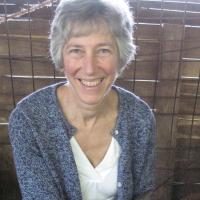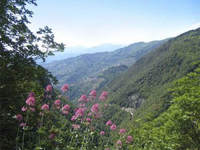A story about Lucca and the Garfagnana
|
Sapori e Saperi means flavours and knowledge. It grew out of my search for a fourth career, this time in the field of food. I had no idea it would take me to Lucca in northwest Tuscany. What we eat and how it’s produced had fascinated me even before my first career as an archaeologist studying the early history of agriculture. Outside the renaissance walls of Lucca, I discovered the modern version of those earlier inhabitants: people who know the hard work and satisfaction of producing the food of their ancestors—nutritious, full of flavour and never boring or standard.
These people have become my friends, and for me there is no greater pleasure than taking you to learn with them and experience the delight of a new spectrum of flavours. Before I appeared at their workshops, they had rarely seen a foreign tourist, and most speak only Italian, but they’re delighted to welcome you. Your visit puts money in their pockets, but even more importantly boosts their self-esteem and makes it more likely that their children will carry on after them. Alongside the bakers, butchers, cheesemakers and farmers are mediaeval castles, romanesque churches, weavers, blacksmiths, broom and paper makers, concerts and village festivals. A world away from fevered urban bustle, clamorous noise and frightening events. A world where people don’t lock their doors and children play in cobbled streets. ‘The greatest treasure that can be found during a tour with Sapori & Saperi Adventures is the emotional connection you will develop with people who live authentic and genuine lives centered around the well being of their communities and culture.’ CC, USA, May 2017 |
Discovery
I'd always been half in love with a romanticized storybook version of traditional rural life. Here I'm nose to nose with the daily reality. It's part of almost everyone's life — working in the woods, the water mill and the wood-fired bakery. From the butcher's shop to the village bar, it beckons seductively from every doorway.
I start to meet some of the people and to eat their food. Piero and his wine and olive oil, Severino and Gino and their biroldo blood sausage, Bruno and his chestnuts, Rolando and his prosciutto crudo 'Il Bazzone', Paolo and his potato bread, Ercolano at his water mill and Andrea, king of food in the Garfagnana, at his osteria in Castelnuovo where eating and drinking slowly and well are all that matter.
Other people have to try this food, pick the olives, meet these hard-working, independent, spirited people. But not too many or we won't all fit into Germana's cheese parlour or Nadia's kitchen. Eight or ten at a time will be enough. And so the Gastronomic Adventures take shape...
I start to meet some of the people and to eat their food. Piero and his wine and olive oil, Severino and Gino and their biroldo blood sausage, Bruno and his chestnuts, Rolando and his prosciutto crudo 'Il Bazzone', Paolo and his potato bread, Ercolano at his water mill and Andrea, king of food in the Garfagnana, at his osteria in Castelnuovo where eating and drinking slowly and well are all that matter.
Other people have to try this food, pick the olives, meet these hard-working, independent, spirited people. But not too many or we won't all fit into Germana's cheese parlour or Nadia's kitchen. Eight or ten at a time will be enough. And so the Gastronomic Adventures take shape...
njvfav nasvpaiuhdva ahuviaoeiv aehvuioa vaeuiv aeouhv aeiuvbiauebvouaerhv ehruvipaerhv aerorvhaievhsuvhuaehouv
Flavours and Knowledge
Knowing something by experience is a whole different kettle of fish from knowing it by reading. I've managed some projects for Neal's Yard Dairy where I heard a lot about cheesemaking, and I read books about it. I thought I knew how you make cheese. Then I visited Verano Bertagni at his caseificio. That's when I found out that making cheese is a dance and you have to keep up with the rhythm of the coagulating curds, the changing acidity, the draining whey. You lose the beat at your peril.
For reading addicts breaking the habit is tough. I haven't gone cold turkey on the cookbooks yet, but I'm working on it. The therapy goes like this. You buy the local meat, fruit and vegetables in the local shops. What's there is what's in season. You ask the shopkeeper how she cooks them and go home and try it. You eat in lots of family restaurants to taste how they combine ingredients to produce the flavours of the cuisine. You visit producers and find out why they spend all that time removing the inner chestnut skins by hand. You ask chef Gianluca Pardini to teach you what he learned from his mother. You stop reading while eating. Your taste buds wake up and start having fun.
True, you develop a phobia for plastic-wrapped cheese and asparagus in December. But important changes require some sacrifices. That's one you'd have to make if you come on a Gastronomic Adventure.
For reading addicts breaking the habit is tough. I haven't gone cold turkey on the cookbooks yet, but I'm working on it. The therapy goes like this. You buy the local meat, fruit and vegetables in the local shops. What's there is what's in season. You ask the shopkeeper how she cooks them and go home and try it. You eat in lots of family restaurants to taste how they combine ingredients to produce the flavours of the cuisine. You visit producers and find out why they spend all that time removing the inner chestnut skins by hand. You ask chef Gianluca Pardini to teach you what he learned from his mother. You stop reading while eating. Your taste buds wake up and start having fun.
True, you develop a phobia for plastic-wrapped cheese and asparagus in December. But important changes require some sacrifices. That's one you'd have to make if you come on a Gastronomic Adventure.
Traditional and Modern
The motto for the Garfagnana is 'il tempo non corre' ('time stands still'). But this isn't strictly true. Some traditions need propping up. Slow Food has designated the biroldo, 'Il Bazzone' and the potato bread as Presidium products to protect them from disappearing. Many a cheesemaker and salumi producer has stainless steel fittings, an electric sausage-skin filler, gas burners. But nonna, the grandmother, hasn't followed the old equipment onto the rubbish heap. The taste of her cooking is still on everyone's tongues; on Sundays the car park at my village is stuffed with the cars of the children stuffing themselves with nonna's cooking; and even the supermarkets pay homage to nonna. Young bank clerks with university degrees give up their office jobs after a couple of years to expunge the ink from their fingers in a mountain of chopped pig's head in the family salumificio.
You can't help wondering what went wrong in Britain, America and elsewhere. What did we do with granny? Why doesn't it even occur to us to be perplexed, as the woman who taught me to bake bread in a wood-fired oven is: 'I don't understand young people these days. They go to the city to work for money to pay other people to live their lives for them. I bake my own bread, I prune my own apple trees, I feed my own chickens.' She beams with pride and self-confidence. A traditional, liberated woman with plenty of time to give me lessons and philosophize about modern life. Her husband is a car mechanic. The traditional and the modern.
Maybe these Gastronomic Adventures will give us some clues about how to weave the traditional back into our modern lives. Maybe they'll give us the courage to change our lives just a tiny bit.
You can't help wondering what went wrong in Britain, America and elsewhere. What did we do with granny? Why doesn't it even occur to us to be perplexed, as the woman who taught me to bake bread in a wood-fired oven is: 'I don't understand young people these days. They go to the city to work for money to pay other people to live their lives for them. I bake my own bread, I prune my own apple trees, I feed my own chickens.' She beams with pride and self-confidence. A traditional, liberated woman with plenty of time to give me lessons and philosophize about modern life. Her husband is a car mechanic. The traditional and the modern.
Maybe these Gastronomic Adventures will give us some clues about how to weave the traditional back into our modern lives. Maybe they'll give us the courage to change our lives just a tiny bit.
Responsible Tourism
Let's face it—the only truly responsible tourism is staying at home and exploring your own back garden, walking or cycling to those interesting places you've always been meaning visit. Yet, there's much truth in the old adage, 'travel broadens the mind', and there are lessons to be learned from faraway people and places that can be applied to your life at home. Sapori e Saperi's mission is to guide you to those life-enhancing experiences while making tourism work to sustain the rural economy and its people. You will encounter an endangered lifestyle which we don't want to disappear. The accommodation we use is owned by Italian farmers; all the farmers, food artisans, cooking teachers and craftspeople are Italian and we pay them for visits and lessons.












